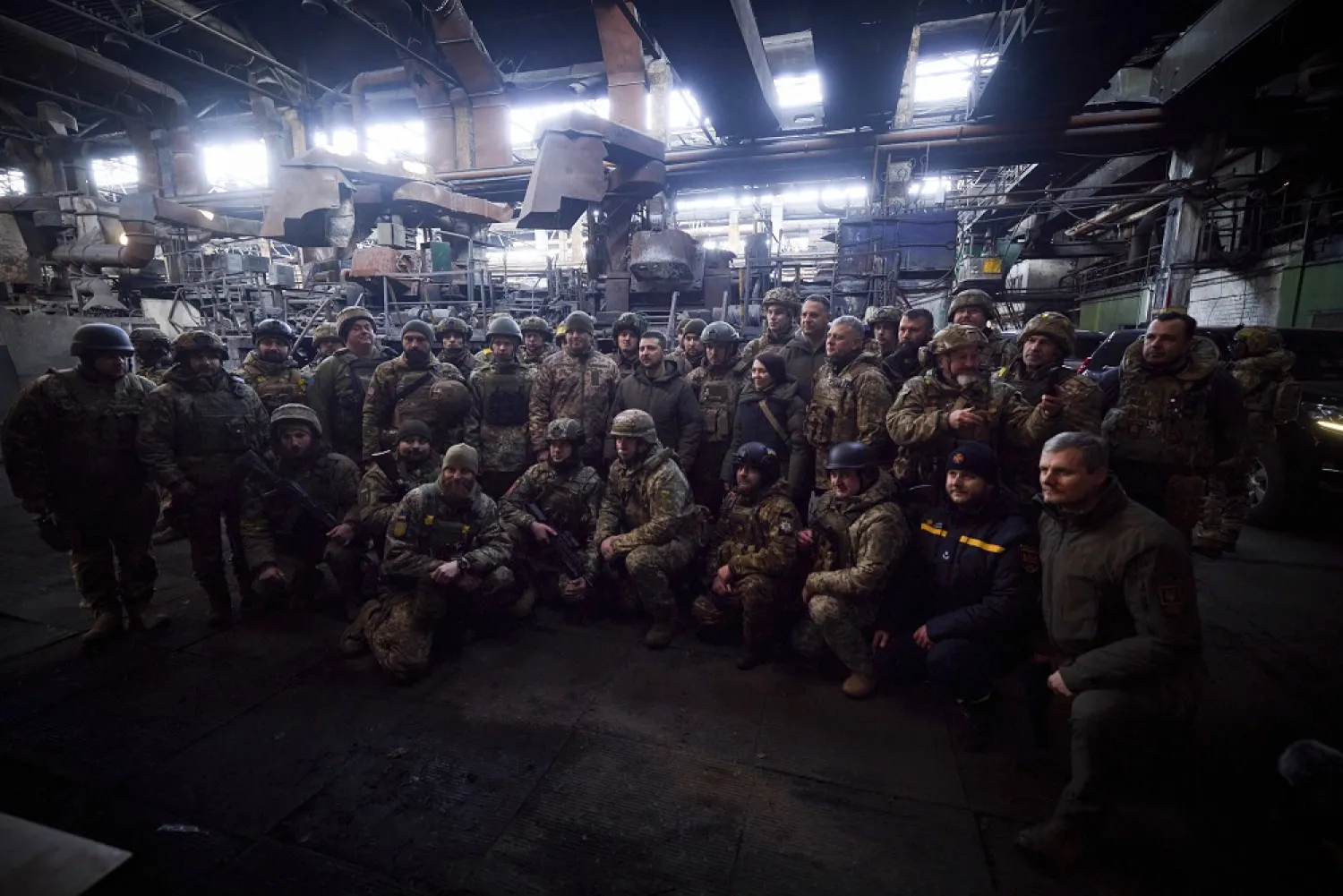Ukrainian President Volodymyr Zelenskyy visited the eastern city of Bakhmut, the scene of some of the most intense combat since Russia invaded the country, meeting Tuesday with troops and praising their "courage, resilience and strength" as artillery boomed in the background.
Russian President Vladimir Putin also hailed the "courage and self-denial" of his forces in Ukraine — but he did so at a ceremony in an opulent and glittering hall at the Kremlin.
Both leaders sought to build morale as the stalemated conflict grinds through its 10th month and winter sets in.
Zelenskky met with military personnel in a dimly lit building — possibly a disused factory — in Bakhmut, which he has called "the hottest spot on the entire front line," his office said. The city, about 600 kilometers (380 miles) east of Kyiv, has remained in Ukrainian hands, thwarting Moscow’s goal of capturing the rest of Donetsk province and the entire Donbas industrial region.
It was not clear how he got to Bakhmut, but his unannounced trip appeared designed to dishearten the Russians trying to surround the city.
"Bakhmut Fortress. Our people. Unconquered by the enemy. Who with their bravery prove that we will endure and will not give up what’s ours," he wrote on his Telegram channel.
"Since May, the occupiers have been trying to break our Bakhmut, but time goes by and Bakhmut is already breaking not only the Russian army, but also the Russian mercenaries who came to replace the wasted army of the occupiers," he said.
Russia’s invasion, which began Feb. 24, has lost momentum in recent months. The annexed provinces of Donetsk, Kherson, Luhansk and Zaporizhzhia remain fiercely contested. Capturing Bakhmut would sever Ukraine’s supply lines and open a route for Russian forces to press on toward cities that are key Ukrainian strongholds in the province.
Mercenaries from the Wagner Group, a shadowy Russian military contractor, are reported to be leading the charge in Bakhmut. Before Russia’s full-scale invasion, Russia-backed separatists had controlled parts of Donetsk and neighboring Luhansk since 2014. The two provinces together make up the Donbas.
At the Kremlin ceremony on the holiday honoring Russia's military and security agencies, Putin presented awards to the Moscow-appointed heads of four regions of Ukraine that Russia illegally annexed in September.
"Our country has often faced challenges and defended its sovereignty," Putin said. "Now Russia is again facing such challenge. Soldiers, officers and volunteers are showing outstanding examples of courage and self-denial on the front line."
In a video address by Putin released before Tuesday's ceremony, he praised the security personnel deployed to the four regions, saying that "people living there, Russian citizens, count on being protected by you."
"Your duty is to do all that is needed to ensure their safety and protection of rights and freedoms," the former KGB operative said. He promised to reinforce units there with more equipment and personnel. The regions are under pressure from a Ukrainian counteroffensive.
Putin also called on counterintelligence officers to step up efforts to "derail activities by foreign spy agencies and quickly track down traitors, spies and saboteurs."
British authorities, meanwhile, gave a bleak assessment of how the war is going for Russia.
Some 100,000 Russian troops were "dead, injured or have deserted" since the invasion began, UK Defense Secretary Ben Wallace said. Wallace didn’t give a figure for Ukrainian casualties, but a senior US military recently put the estimated number of Ukrainian troops killed and wounded at about 100,000.
"Not one single operational commander then in place on Feb. 24 is in charge now," Wallace told lawmakers in the House of Commons. "Russia has lost significant numbers of generals and commanding officers."
"Russian capability has been severely hampered by the destruction of more than 4,500 armored and protected vehicles, as well as more than 140 helicopters and fixed wing aircraft," Wallace said.
After 300 days of war, the UK Ministry of Defense tweeted, Ukraine has liberated about 54% of the maximum amount of extra territory Russia seized in the invasion. It didn’t say what portion of the Ukrainian territory Russia controlled at the peak of its gains.
Russia now controls about 18% of internationally recognized areas of Ukraine, including those parts of the Donbas and Crimea seized earlier, it said.
Zelenskyy's office said at least five civilians killed and eight wounded since Monday, with Russian forces attacking nine southeastern areas.
Donetsk Gov. Pavlo Kyrylenko said 19 cities and villages in the region were shelled by Russia in the past day. Luhansk Gov. Serhiy Haidai said the province was on the verge of a humanitarian catastrophe, telling Ukrainian television that residents "are living in basements without heating, food or medication" and have to burn furniture to keep themselves warm.
With the fighting in the east at a stalemate, Moscow has used missiles and drones to attack Ukraine’s power, hoping to leave locals without electricity as freezing winter weather sets in.
Life in the Ukrainian capital took a minor but welcomed step toward normality with the reopening of two of Kyiv’s main subway stations for the first time since the start of the war. The key hubs of Maidan Nezalezhnosti and Khreschatyk, like the capital’s other underground stations, have served as shelters during Russian air raids.
"It’s the feeling that despite everything, we are returning to a routine that we were used to," said 24-year-old passenger Denys Kapustin. "This is very important, very important."









